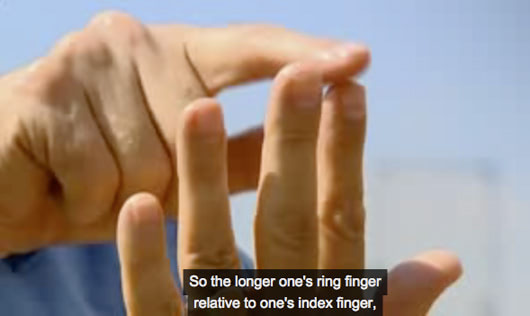The human body is increasingly recognized as a biometric source of information for a wide spectrum of issues, including security, psychopathology, personality and health. Earlier we reported that job interviews might be replaced by brain scans within five years and denoted this news as a modern technological incarnation of occult palm reading. Now it turns out that palm reading itself has found a new incarnation – it’s in the ratio of your fingers.
John T. Manning, emeritus professor in psychology of the University of Central Lancashire and the University of Liverpool, has developed a new theory about how finger length relates to human biology and behavior. In the BBC series ‘Secret of The Sexes’, Manning successfully uses finger length ratio as a predictor for athletic ability.
A significant part of theory is focused on the so-called: ’digit ratio’, which concerns the full length ratio of only two fingers: index finger (2D) vs. ring finger (4D). In women the length of both fingers is usually about equal (2D:4D digit ratio = 1.00), while in men the ring finger is usually slightly longer (digit ratio = 0.98): a tiny sex difference.
FINGER LENGTH & SOCIAL ABILITY
The researchers on brain scans showed they can predict tendencies towards autism, which is thought to be related to ‘hypermasculinity’ of the brains. The same is true for the ’digit ratio’: multiple international studies have revealed that people with autism usually have typical male-like finger length ratios (2D:4D < 0.94).
FINGER LENGTH & ATHLETIC ABILITY
Maybe less surprising, professor Manning found the typical male-like low digit ratio relates to athletic ability as well. In the BBC series ‘Secret of The Sexes’, Manning explains the link between finger length & athletic ability as follows:
“Our fingers have information about how much testosterone and how much estrogens we’ve been exposed to in the womb. So, the longer one’s ring finger relative to one’s index finger, the more testosterone you’ve had. And that testosterone has an effect on the brain, and on the body. If a boy has a large amount of testosterone before birth, he is likely to be born with a very efficient heart and vascular system.”
“So the longer one’s ring finger relative to one’s index finger, the faster one can run.”

The BBC’s “Secret of The Sexes” confronted the ‘finger Professor’ with six athletes – all 5000 meter specialists, and asked him to “predict” the outcome of the race based on finger length only. Actually, the BBC provided Manning photocopies of the athletes hands, and in return Professor Manning risked his reputation by providing the results of a race that had yet to be run.
The outcome of the experiment is unveiled “LIVE” in the video. And surprisingly… the theory appeared to be pretty accurate in practice. After Manning & the athletes are confronted with the results Manning summarizes:
“… We’ve got four out of six right, but the two that are wrong were kind a quite close.”
The winner of the 5000 meter race responds: “I thought… that finger thing is bullocks because there are so many variables… I am very impressed”.
Manning’s theory was also confirmed by the results of various studies e.g. on endurance running & sprinting speed. And in another likewise experiment finger length correctly predicted the outcome of a 100 meters race with 5 young sprinters.
FINGER LENGTH & OTHER LIFE ISSUES
In his second book – titled ‘The Finger Book‘ – Professor Manning explains that because of the prenatal link with the androgens (testosterone & estrogen), finger length studies have generally shown consequent sensible correlations with a rainbow of life issue.
The tiny sex difference appears to be highly revealing, for hundreds of studies the ’2D:4D digit ratio’ appears to correlate with a wide range of topics that are usually also known for a typical male-female difference, including: musical ability, personality, health, and even sexual preference.
Via Finger length & digit ratio news. Image: Jamaican world record holder 100 meter sprint Usain Bolt (In general Jamaicans are know for having a low digit ratio, which nicely coincides with their reputation as the world fastest athletes).


Comments (0)
Share your thoughts and join the technology debate!
No comments yet
Be the first to share your thoughts!